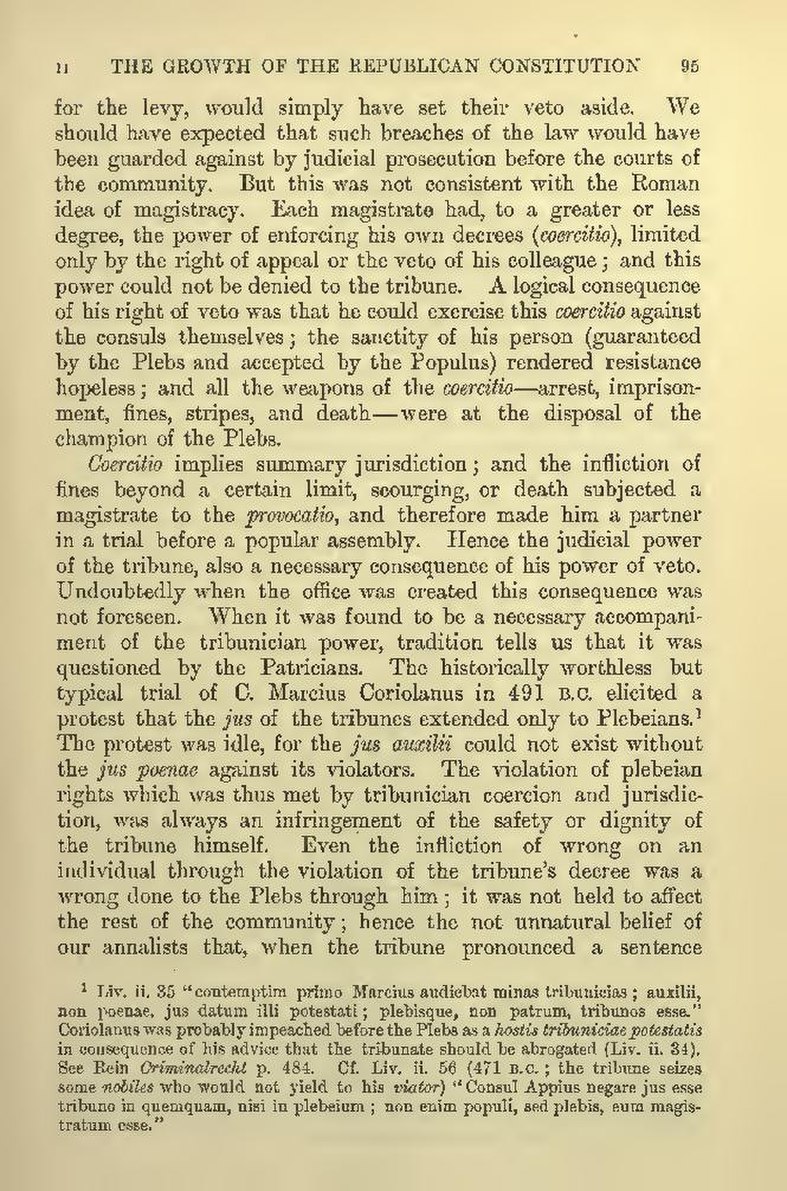for the levy, would simply have set their veto aside. We should have expected that such breaches of the law would have been guarded against by judicial prosecution before the courts of the community. But this was not consistent with the Roman idea of magistracy. Each magistrate had, to a greater or less degree, the power of enforcing his own decrees (coercitio), limited only by the right of appeal or the veto of his colleague; and this power could not be denied to the tribune. A logical consequence of his right of veto was that he could exercise this coercitio against the consuls themselves; the sanctity of his person (guaranteed by the Plebs and accepted by the Populus) rendered resistance hopeless; and all the weapons of the coercitio—arrest, imprisonment, fines, stripes, and death—were at the disposal of the champion of the Plebs.
Coercitio implies summary jurisdiction; and the infliction of fines beyond a certain limit, scourging, or death subjected a magistrate to the provocatio, and therefore made him a partner in a trial before a popular assembly. Hence the judicial power of the tribune, also a necessary consequence of his power of veto. Undoubtedly when the office was created this consequence was not foreseen. When it was found to be a necessary accompaniment of the tribunician power, tradition tells us that it was questioned by the Patricians. The historically worthless but typical trial of C. Marcius Coriolanus in 491 B.C. elicited a protest that the jus of the tribunes extended only to Plebeians.[1] The protest was idle, for the jus auxilii could not exist without the jus poenae against its violators. The violation of plebeian rights which was thus met by tribunician coercion and jurisdiction, was always an infringement of the safety or dignity of the tribune himself. Even the infliction of wrong on an individual through the violation of the tribune's decree was a wrong done to the Plebs through him; it was not held to affect the rest of the community; hence the not unnatural belief of our annalists that, when the tribune pronounced a sentence
- ↑ Liv. ii. 35 "contemptim primo Marcius audiebat minas tribunicias; auxilii, non poenae, jus datum illi potestati; plebisque, non patrum, tribunos esse." Coriolanus was probably impeached before the Plebs as a hostis tribuniciae potestatis in consequence of his advice that the tribunate should be abrogated (Liv. ii. 34). See Rein Criminalrecht p. 484. Cf. Liv. ii. 56 (471 B.C.; the tribune seizes some nobiles who would not yield to his viator) "Consul Appius negare jus esse tribuno in quemquam, nisi in plebeium; non enim populi, sed plebis, eum magistratum esse."
